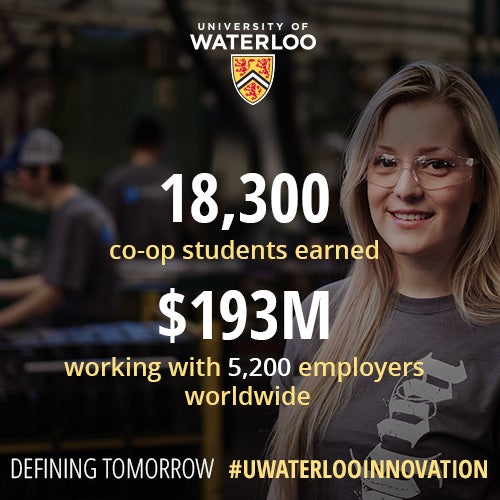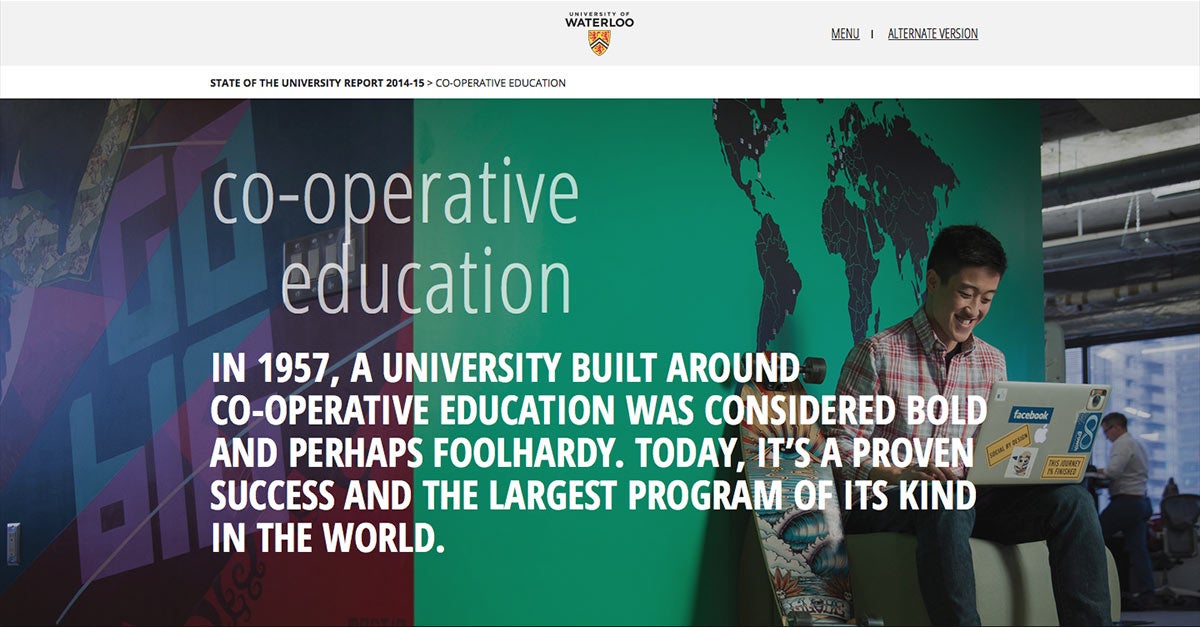co-operative education
In 1957, a University built around co-operative education was considered bold and perhaps foolhardy. Today, it’s a proven success and the largest program of its kind in the world.
Ron Yu, a Management Engineering student in the Faculty of Engineering, puts his passion for leadership and business strategy into practice every day. In his co-op job at Facebook Canada, he constructed a scalable revenue model, marketed to top clients and helped lead nationwide events.
Co-op was amazing at Waterloo. My first term, I started at the help desk at Dow Chemical. By the end of that co-op term, I believe there were about 24 people … reporting to me. … Co-op really taught me that hard work and dedication and passion about something you’re interested in can carry you as far as you want to go.
JOHN BAKER CEO of Desire2Learn, founded his company while a Systems Design Engineering student at Waterloo in 1999. Desire2Learn now has 750 institutional clients and 10 million users. From the documentary Startup Community
Waterloo co-op students Nemica Thavarajah (L) and Natalie Pulenzas, of the Faculty of Applied Health Sciences, examine patient scan information while on a work term at Sunnybrook Health Sciences Centre.
My experience at Sunnybrook went beyond what I ever dreamed of accomplishing through co-op. ... It was one thing to learn theories in class, but these concepts meant so much more after applying them to real clinical settings. Co-op definitely opened my eyes to a world of possibilities for a career in health care.
NEMICA THAVARAJAH (BSc ’14) published research on pain management for cancer patients as a co-op student with the Rapid Response Radiotherapy Program at Sunnybrook Health Sciences Centre in Toronto
In the Department of Physics and Astronomy, I see how the co-op experience changes students. The first co-op job — that's where we see the first transformation. They grow into adults, learn responsibility and how to plan for their future. By the third or fourth co-op term, they become good physicists, develop good managerial, entrepreneurship and time management skills and reap the benefits of experiential learning. When they graduate, they are well-rounded physicists. This is the beauty of the co-op program.
Rohan Jayasundera (BSc ’82), Senior teaching fellow in the Faculty of Science
Lauren Hummel of the Faculty of Science gained hands-on experience in the manufacturing sector during her first co-op work term as a production worker at Nahanni Steel Products Inc., in Brampton, Ontario.
Students at the University of Waterloo are incredibly unique, completing up to six co-op terms in real companies with real responsibilities. They graduate knowing how companies work, how teams operate and how to add value, able to hit the ground running unlike almost any other students in the world.
Ted Livingston, Kik Interactive founder and CEO, who studied engineering at the University of Waterloo
By The Numbers
Experiential education extends beyond co-op in many programs including the aviation program, which is offered by the Faculty of Environment and Faculty of Science. Pictured here is Jomo McCormack (BES '13), who gained experience in business, climatology and geomatics, all essential for a career as a pilot.

